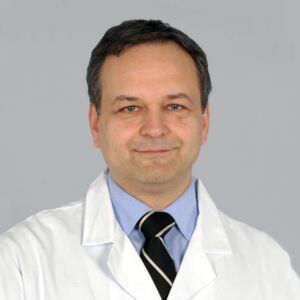Doctors usually combine several cancer treatments in order to increase their effectiveness. A complete cure can only be achieved through surgery if doctors succeed in completely eliminating the tumor. However, it is often so advanced at the time of diagnosis that it can no longer be removed by surgery. If metastases have also formed, gallbladder cancer and bile duct cancer are no longer curable. Palliative treatment then helps. It aims to slow down the progression of the tumor, alleviate symptoms, prolong life and maintain a good quality of life for as long as possible.
Surgery - removing the tumor
In the case of gallbladder cancer, surgeons remove the gallbladder and sometimes also part of the bile ducts and liver as part of an operation – depending on the extent of the tumor. Doctors also try to remove the tumor from the bile ducts in the case of bile duct cancer. Sometimes the tumor can be shrunk before surgery with the help of chemotherapy or radiation. Then the operation can be performed more gently.
Bile duct drainage is a method of relieving bile stasis. Doctors insert small vascular supports (stents) made of plastic or metal into the bile ducts so that the bile can drain into the intestine. The stents function like a drainage system and keep the bile ducts open. However, there is always a risk that the small tubes will become blocked.
Liver transplantation for perihilar cholangiocarcinoma
Liver transplantation is developing into a promising treatment option for selected patients with perihilar cholangiocarcinoma. In Zurich, we have adopted the practice of the Mayo Clinic in the USA of treating certain patients with perihilar cholangiocarcinoma by means of a liver transplant. The criteria are stringent in order to prevent the probability of tumor recurrence. There is the possibility of receiving an organ or a living liver transplant from the transplant waiting list. The results with the Mayo protocol are very good due to the strict selection of patients with limited tumor involvement.
Photodynamic therapy
Photodynamic therapy uses irradiation with laser light to treat bile duct cancer. First, doctors administer a substance that makes the cancerous tissue sensitive to laser beams, a so-called photosensitizer. An endoscope is used to introduce laser light into the bile duct, which destroys the tumor tissue. Healthy tissue is largely spared.
Radiotherapy (radiation therapy)
Radiotherapy uses high-energy X-rays to slow down cancer growth and shrink tumors. In contrast to chemotherapy, which affects the entire body, radiation only has a local effect. The rays damage the genetic material of the cancer cells, the DNA. Tumor cells are less able to repair these than healthy cells – so they die. Details on the use of radiotherapy for gallbladder cancer can be found here.
Chemotherapy
During chemotherapy, doctors use powerful cytotoxic agents. Doctors usually combine several medications in order to increase the effectiveness of the treatment. Cytostatic drugs target cells that divide rapidly. These include cancer cells, but also skin, mucous membrane or blood cells. Hair loss, diarrhea or changes in the blood count are common side effects. Chemotherapy slows down the growth of cancer cells, prevents cell division and kills them. Chemotherapeutic agents act throughout the body. Chemotherapy is an option for bile duct cancer that cannot be operated on and when the bile is well drained from the body. It can stop the growth of the tumor and extend the survival time.
Palliative treatment
Palliative therapy is used if the cancer in the gallbladder or bile ducts is already at an advanced stage and metastases in other organs are detectable. The cancer is then no longer curable. Palliative care aims to slow down the progression of the tumor, alleviate symptoms and prolong survival – while maintaining a good quality of life.

Certificate Publications


